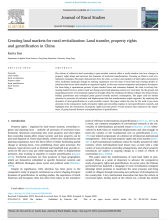/ library resources
Showing items 1 through 7 of 7.The reform of collective land ownership in post-socialist contexts offers a useful window into how changes in property rights shape and structure the dynamics of territorial transformation.
Different forms of income diversification represent important strategies of farmers to either cope with the changing economic framework conditions or to valorise given territorial potentialities.
We analyze the impact of land fragmentation on production diversification in rural Albania. Albania represents a particularly interesting case for studying land fragmentation as the fragmentation is a direct outcome of land reforms.
This country case study summarises key findings from a country analysis of financing for rural development in Uzbekistan. It is one of 20 analyses that is synthesised for comparison in Prizzon et al. (2020).
The case study has two main objectives:
El presente trabajo desarrolla el concepto de formalización de la propiedad de la tierra, en tanto respuesta institucional a diferentes problemas rurales como la informalidad en la tenencia de la tierra, el despojo y abandono forzado de tierras, la concentración de la propiedad rural y los cultiv
While scholars long recognized the importance of land markets as a key driver of rural non-farm development and transformation in rural areas, evidence on the extent of their operation and the nature of participants remains limited.
Uganda’s progress in reducing poverty from 1993 to 2006 is a remarkable story of success that has been well told. The narrative of Uganda’s continued, albeit it slightly slower, progress in reducing poverty since 2006 is less familiar.
Land Library Search
Through our robust search engine, you can search for any item of the over 73,000 highly curated resources in the Land Library.
If you would like to find an overview of what is possible, feel free to peruse the Search Guide.






